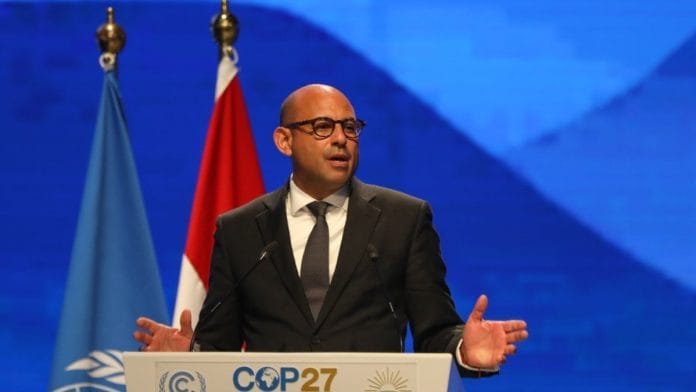New Delhi: As president of the G20 this year, India should use its position to leverage the political will needed to effect climate action, executive secretary of the United Nations Framework Convention on Climate Change (UNFCCC), Simon Stiell, said here Friday.
Stiell was speaking at the three-day World Sustainability Development Summit organised by The Energy and Resources Institute (TERI), where he stressed the role G20 countries could play in mitigating the effects of climate change. Together, the G20 countries account for around 80 per cent of global greenhouse gas emissions.
“We look to India, and its influential role as presidency of the G20 to help us deliver a clear political framework and help shape the outcomes we must see at COP28,” Stiell said, referring to the annual Conference of Parties that convenes under the UNFCCC.
The COP28 will also see the completion of the first-ever stocktaking exercise assessing the implementation of the Paris Agreement — the pact to limit the effects of global warming to “well below” 2 degrees above pre-industrial levels — which was signed at the COP21 in 2015.
“The Stocktake must provide a course correction for the climate process needs, and build a tangible roadmap to 2030,” Steill said, adding that the results of the Global Stocktake should be linked to the outcomes of future COPs, too, where climate finance and increasing climate ambition will be key areas of focus.
The panel included secretary of the Union Ministry of Forests, Environment and Climate Change, Leena Nandan, Sri Lanka’s Environment Minister Naseer Ahamed, and Jennifer Morgan, special envoy for International Climate Action, Federal Foreign Office, Germany.
India’s focus at the COP28 will be on climate adaptation, Nandan said at the event. Climate adaptation refers to the activities that can help societies and ecosystems adapt to a warming climate.
“We know that adaptation is something that concerns vulnerable communities and societies world over. There are entire countries that are vulnerable to the effects of climate change. That is where support is required, because that is what equity demands and that is what climate justice demands,” Nandan said.
Scientists warn that the world will warm by at least 2.3 degrees by the end of the century if drastic steps are not taken to reduce emissions within this decade.
Also read: IMD issues ‘heat stress’ advisory to wheat farmers amid high temperatures
On funding
The COP27 had ended with the establishment of a ‘Loss and Damage Fund’ — a fund to address the needs of vulnerable countries that are already faced with the destructive effects of climate change beyond their adaptive capacities.
The establishment of a loss and damage fund “provided hope, but left many questions unanswered,” said Sri Lanka’s Ahamad, adding that the Sri Lanka government proposes setting up a Climate Justice Forum that would ensure “science, and not geopolitics, writes how climate finance and the loss and damage fund should evolve.”
Climate finance — money from rich countries to help poorer ones adapt to and mitigate the effects of climate change — has been a contentious topic of debate at the COPs. Developed countries had pledged, in 2009, to mobilise $100 billion in climate finance by 2020, a goal that has not yet been achieved.
Multilateral development banks, private markets, and public finance flows have been unable to invest sufficiently in vulnerable countries that need to improve their adaptive capabilities, research shows.
Ahamad said Sri Lanka would propose setting up a ‘Biosphere Reserve Bank’ — an international development bank — to the COP28 presidency.
“Climate finance is all about protecting and restoring the biosphere for our future generations,” he said.
(Edited by Smriti Sinha)
Also read: Green think tank CEEW suggests EU & Korea-like ‘emissions trade’ for India’s carbon market launch






